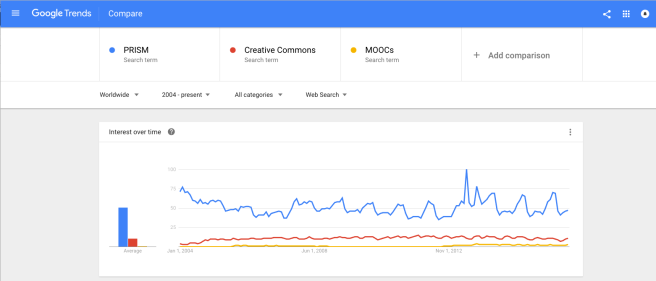Wiley (2010) proposed in his TEDxNYED talk that we faced a reformation of  the 21st century in the form of openness as a result of the innovation of Internet. He drew reference to the 15th century printing press technology revolution, and how it was stunted by the “most draconian restrictions on information dissemination ever, something that makes a global DMCA look like a parade [sic] of rainbow sparkle ponies”. He proceeded to describe how the Church prohibited the printing of the bible in the vernacular of the people, but “ramped up the production of indulgences” that people could buy. These indulgences were pieces of paper that allowed people to buy forgiveness for various ‘indulgences’, of which there were 31 varieties available (Wagner & Reed, 2010, cited in Wikipedia, n.d). If anyone was caught disseminating a translated printed bible in the vernacular of the people, not only were they hanged, but their bodies were burnt afterward (Wiley, 2010).
the 21st century in the form of openness as a result of the innovation of Internet. He drew reference to the 15th century printing press technology revolution, and how it was stunted by the “most draconian restrictions on information dissemination ever, something that makes a global DMCA look like a parade [sic] of rainbow sparkle ponies”. He proceeded to describe how the Church prohibited the printing of the bible in the vernacular of the people, but “ramped up the production of indulgences” that people could buy. These indulgences were pieces of paper that allowed people to buy forgiveness for various ‘indulgences’, of which there were 31 varieties available (Wagner & Reed, 2010, cited in Wikipedia, n.d). If anyone was caught disseminating a translated printed bible in the vernacular of the people, not only were they hanged, but their bodies were burnt afterward (Wiley, 2010).
So this description of the draconian restrictions and outdated thinking impacting on progress, made me think of our current situation. Wiley brought up the question of Openness, and touched on the topic of the DMCA, but only briefly…led me to think of how the DMCA and the issues around PRISM could be impacting on how OPEN we intend to be. Will Openness succeed with such laws, and outdated thinking, understanding how long it takes to promulgate new laws, especially in the international arena. Let us not forget how those who wish to bring about more transparency, and highlight the abuses of privacy; Julian Assange and Edward Snowden – are both hunted men. PRISM the notorious NSA surveillance programme that accumulates all communication.
So how does this impact on our thinking of sharing and willingness to ‘expose’ ourselves in the online world? On the one hand we are told: “Share as much as possible”…and then on the other hand, we hear horror stories of how Big Brother is watching us and that we need to curb what we share.
This also made me think of the trends of how much people are aware of “Openness” vs. concepts of DMCA and PRISM? So I took at look at the online trends…and I was not surprised:
PRISM dominated the trend line and MOOCs barely covered the bottom horizon.
So how do we counter the media that creates such fear in our minds about how our digital footprint will be mined about such minute details of information and stored in governmental warehouses to be ‘used in case we step out of line’? When the reality is that openness is the necessity of our future, when in India alone there would need to be a university built every second week to cater for demand for higher education (Wiley, 2010).
There is indeed a long road ahead of us, if we keep encountering roadblocks the size of mountains like PRISM, when we have the media supporting this elusive boogie man in the night. Moreover, it does not help when we have laws like the DMCA undermining concepts like creative commons and public domains. Something needs to happen to shake up governments around the world to show them we need more openness so that the laws can at least support the efforts being made by educators and supporters of Openness.

Very interesting contradiction you bring up here! I think we could use perhaps a restrictred -or more limited definition- of openness in education. Perhaps it could refere to only the course material, perhaps even some of the reflections and comments/discussion teachers and students have in a course. Even for the latter we could have always a posibility that students can choose how openly they want their comments to be? So using LMS platforms that allow for a certain measure of restrictiveness in openness could solve part of the problem? Or at least make it harder to access this type of information for the common user 😉
LikeLike
Interesting! I think that knowing one is publishing work “openly” will make one think twice about what exactly is being published , which is what we should all be doing anyway in terms of online personal branding. Nothing is really “closed” online
LikeLike
Yes, I guess we do, but that is my point…that although we might need to ‘think twice’ before posting…the problem is that most people are more aware of privacy issues and PRISM than they are aware of sharing and the principles of openness. Media has hyped up the quintessential bogieman, that is PRISM, which I think makes it more difficult to highlight the awareness of sharing and openness…so effectively media and laws are counter-productive to the ‘battle of openness’ if you will? Do you not agree?
LikeLike
Interesting Blog Sonja. It is totally clear that discussion and developing skills on this topic is needed for young instructional designers, developers of education and teachers.
LikeLike